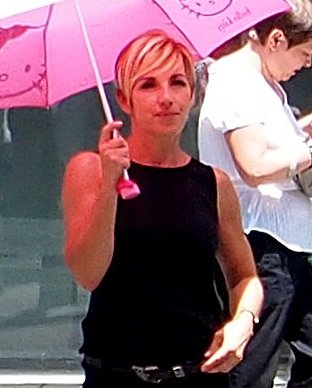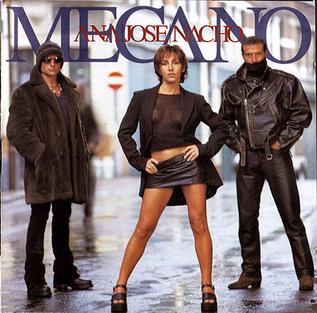
Mecano was a Spanish pop band formed in 1981 and active until 1992. Mecano became one of the most successful Spanish pop bands of all time. The band is still the best-selling Spanish band, with over 20 million records worldwide. They were considered by some to be avant-garde for their time and part of la Movida Madrileña countercultural movement. They had a brief comeback in 1998.

Ana Torroja Fungairiño, 3rd Marchioness of Torroja, is a Spanish singer. She was the lead singer of the pop trio Mecano, considered one of the most popular pop bands from Spain during the 1980s and 1990s. Mecano split in 1998 and she embarked on a solo career.

Rata Blanca is an Argentine heavy metal band, formed in 1986.

Fanny Cano Damián was a Mexican actress and producer.

Hoy no me puedo levantar is a Spanish jukebox musical, with music and lyrics by José María Cano and Nacho Cano, former members of the band Mecano. Based on 32 of the band's greatest hits and named after their first single, the musical centers on a pair of impoverished musicians trying to be part of La Movida Madrileña, after the fall of Francisco Franco's dictatorship. Through an analysis of the 1980s, the musical portrays the condition of these boys trying to survive in Madrid, under the shadow of drugs and AIDS. The musical ran for four seasons in Madrid's Rialto Theatre and for three seasons in Mexico City's Centro Cultural Telmex and Teatro Aldama. It was produced by Drive in Spain and OCESA Teatro in Mexico.
Grupo Montéz de Durango or Montéz de Durango is a regional Mexican band that specializes in the duranguense genre. They are based in Aurora, Illinois, and are well known in the United States, Mexico and Central America.

"Hijo de la Luna" is a song written by José María Cano performed originally by the Spanish band Mecano with lead singer Ana Torroja. It appeared on their 1986 album, Entre el cielo y el suelo, and had great success all over the Spanish-speaking world, as did the album. From 28 December 1998 to 16 January 1999, a cover version by Loona topped the German charts, and reached number two on the Swiss singles' chart.

"Une femme avec une femme" is a 1990 song by Spanish pop band Mecano. In late 1990, it was released as a single from the band's seventh album, released in 1988, Descanso dominical, on which it appears as the third track. It became a hit in France, hitting number one for seven weeks. Also in 1990, the song was notably covered by the pop duo formed by Argentine singers Sandra Mihanovich and Celeste Carballo as the title track of their studio album Mujer contra mujer, which is regarded as a landmark by the country's lesbian community. In 2003, the song was covered by Saya, becoming a top-10 hit in France.

Ya viene el Sol is the third studio album by the Spanish synth-pop band Mecano, released on October 16, 1984 by CBS Discos. The album was the beginning of a more sophisticated and mature sound. It included new sounds in the band's music, utilising the Fairlight CMI, a digital sampling synthesiser. After this album, the band assumed the production of their records from the start. This album includes the only song that the band's lead vocalist Ana Torroja wrote with the band ("Mosquito"). The importance of the songs written by José María Cano and the fact that, for the first time, one of his songs was released as a single – and became the biggest hit of the summer – kept the band together, since at this point he was considering leaving the band.

Amor Prohibido is the second studio album by Mexican pop singer Daniela Romo. This album was released in 1984.

Aidalai is an album by pop group Mecano. It was released in 1991 and produced by the group. Its launch was in the middle of rumors of the separation of the group due to differences between Nacho Cano and José María Cano. It was their third release with Ariola Records. The title is a play on words: Aidalai → ¡Ay Dalai!, meaning in English something like Oh Dalai!.

Ana José Nacho is a compilation album by the group Mecano. It was released in 1998, and was produced by the group itself. There are two editions: Spain and France. It includes 8 new songs by the brothers Cano: José and Nacho; these tracks were recorded in CTS Studios and Belsize Park in London; and Red Led and Eurosonic in Madrid.

Girados en Concierto is a live-concert double-album by Latin Grammy-winning Spanish musician and actor, Miguel Bosé and Spanish singer Ana Torroja, formerly of the group Mecano. It was released in the U.S. on May 14, 2002. The only completely new song on the album is Corazones (Hearts), a duet written and performed by both; the rest are hits from each of their respective careers. In the case of Torroja the songs include solo hits as well as from her years with Mecano.
La Fuerza del Destino may refer to:

Ignacio Cano Andrés, better known as Nacho Cano, is a Spanish arranger, composer, musician and record producer. He and his brother showed an interest in music in their young lives. At 5, he began to play the Spanish guitar and at 12 he started his first band called "Prisma", with Toti Arboles and Eduardo Benavente, both of whom would later make up the core of the sociocultural movement that took place in Spain after Franco's death, known as the "Movida Madrileña". After playing in several different bands in his early teens, Nacho formed Mecano with his brother Jose and his brother's friend Ana Torroja. At 16, Nacho wrote "Hoy No Me Puedo Levantar". Mecano signed their first record deal with CBS, when Nacho was 17 years old. This first album smashed all sales records in Spain, selling 1,000,000 copies in three months.

Gonzalo Alcaín is a Spanish singer and musical actor. He has been one of the contestants on the second season of the musical talent show The Voice in Spain.
This article includes an overview of the major events and trends in Latin music in the 1980s, namely in Ibero-America. This includes recordings, festivals, award ceremonies, births and deaths of Latin music artists, and the rise and fall of various subgenres in Latin music from 1980 to 1989.
José Luis Ganoza Barrionuevo, known as Pepe Ébano, was a Peruvian-Spanish percussionist who accompanied the main figures of Spanish music. He was the lead percussionist, playing the Bongo on the single Entre dos aguas, a flamenco rumba created by guitarist Paco de Lucía and considered a flamenco masterpiece. He was one of the introducers of the Cajón in flamenco music.














